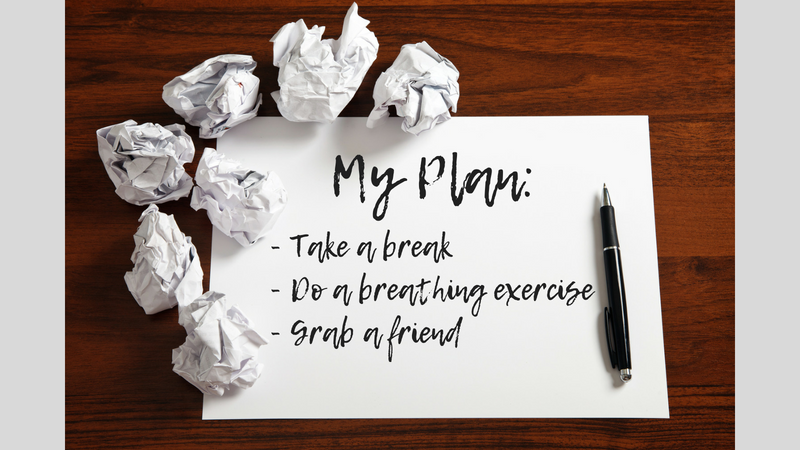Gain Comfort and Safety with a Cope Ahead Plan
A Difficult Day Looms
I run a live support group called “Living Grace” every Wednesday night, and we recently got to talking about Mother’s Day. For me, Mother’s Day has always been pleasant, although we don’t do much for it.
My mother has told us she doesn’t want us doing anything for her, and my family usually takes me out to eat somewhere, and I get a small present from my daughter. It’s nice, and it’s low-key.
Apparently, I’m in the minority when it comes to these experiences. I forget what we were talking about, but one member mentioned that her birthday fell on Mother’s Day this year, and in years past, that has meant her birthday has been lost in honoring her mother.
Another woman chimed in that she gets frustrated with Mother’s Day because somehow the planning of it all falls on her shoulders. Another mentioned that she doesn’t have a good relationship with her mom, and another mentioned a strained relationship with her son.
These things happen. Whether we are talking about the Thanksgiving – Christmas holidays or other events that cause us distress, we all encounter situations that trigger traumatic memories or negative coping mechanisms.
While eventually we can hope and expect to bring down the emotional intensity around them through therapy and learning more positive coping strategies, we need a plan for the short-term that helps us.
A Cope Ahead Plan Can Help
In DBT, Marsha Linehan calls this a “Cope Ahead Plan.” At its heart, a Cope Ahead Plan is a straightforward approach: Identify a stressful situation and figure out how you will handle it. Simple, right?
The first – and most important part – is to determine what situation you need to manage. For the ladies in my support group, that was understanding that Mother’s Day is stressful for them.
We also drilled into why Mother’s Day is stressful for them. After all, if spending time with your mom isn’t stressful but dealing with the rest of the family is an issue, then that is a different problem than a situation where you have a strained relationship with your child.
This is an area where it’s good to talk through the situation with someone safe, such as a therapist or trusted friend, and failing those, journaling is an excellent option as well.
Understanding why a situation makes us feel unsafe, unhappy, or otherwise uncomfortable is critical to putting together an effective Cope Ahead Plan. It may feel like overthinking, but it’s worth taking the time to get clarity here.
As we talked through this in our group, one woman realized that she goes into Mother’s Day expecting it to be terrible because it was more about the kids than it was about her. Another realized that she feels jealous because her son spends more time with his wife than he does with her (“and I’m his mother!”). Another expressed that her mother would usually drop at least one negative comment about her, immediately altering her mood.
Getting this clarity helped the women start to think through what they could do to get better results and how they wanted to shape their Cope Ahead Plan.
Your Cope Ahead Plan Should Fit You
Each explored several options: For the first woman, she considered just asking for a day to herself to get a mani-pedi and a massage; or, instead of telling her husband not to worry about Mother’s Day, she could come up with some low-key options that would make her feel good and remove pressure from her.
Another considered celebrating Mother’s Day with her mom in the morning and then make the afternoon about her birthday. Or celebrating her birthday the day before, and then Mother’s Day on its appropriate Sunday.
By breaking it into two distinct events, she thought that she could be fully present and enjoy both, rather than fuming over feeling minimized on her birthday for the whole day.
For the woman with the son who focused time on his wife and not on her, she considered asking for just the morning or afternoon. As she thought it through, though, she thought that perhaps she could tell him that she wanted him to take her to lunch on another day.
For her, it was more about getting some one-on-one time with her son than it was about celebrating the specific day.
As each woman left for the night, they all had several options in front of them. When they returned the following Wednesday (before Mother’s Day), each had reviewed several different options and determined her Cope Ahead Plan. The first woman had come up with a plan for a day with her family that would be low-stress and low-pressure for her.
When she discussed it with her husband, she was surprised at his response. “I had no idea you felt that way,” he said. “I’m glad we get to give you the day that you actually want.”
Going further, he looked at the one part of the plan that demanded something from her and suggested a way for their kids to take ownership of it instead. Now, she felt excited about the upcoming holiday.
The birthday girl had ultimately decided to give her mother some flowers and a card in the morning and made plans for the rest of the day with friends who she knew wouldn’t be celebrating the holiday with their mothers. She’d bought tickets to a baseball game and had plans to go for dinner.
The last woman had a conversation with her son, who agreed to take her to lunch later that week. She felt excited and was looking forward to getting some private time with him, a diminishing experience since his marriage.
Another woman unexpectedly spoke up and shared that she’d been dreading the day because her mother would make little cutting remarks at her. After our discussion the prior week, she went home and considered how she could handle that situation so that she enjoyed spending the holiday with her mother.
She worked with a friend to come up with a quick script she could use to let her mom know how she felt without laying a guilt trip on her. “Mom, when you make a comment like that, it hurts my feelings and makes me want to avoid spending time with you.”
She wasn’t sure it would work, but she felt better knowing that she had a way to defend herself without getting emotional.
Each of these was a Cope Ahead Plan. While none of them looked the same, each addressed the core issue that each woman faced in approaching the holiday.
The Results of Using a Cope Ahead Plan
The following Wednesday, several of the women rejoined us and shared their experiences. “This was the first Mother’s Day I’ve enjoyed with my family, “ the first woman shared. “I realize that I’ve dreaded the day so much that I never thought about what I wanted and helped them make it real.”
The birthday girl talked about how she’d enjoyed spending time with her mom in the morning, and how her friends were glad to have something guilt-free to do on a holiday that they couldn’t participate in.
She was full of great stories about the experiences of the day and enjoying her friends.
The last woman told us that she’d used her script when her mom said something hurtful. “Don’t be so sensitive!” her mom responded. Yet, the woman told us, she was proud of how she’d handled herself in the situation. Maybe her mom didn’t hear her this time, but now she had a way to defend herself. Over time, she was hopeful that her mom might change. “And even if she doesn’t, at least I have a way to respond.”
This is the entire point of the Cope Ahead Plan: It removes us from the position of victim and puts us into a place of strength. Maybe it’s briefly hiding in the bathroom or going for a ten-minute walk when a party overwhelms us, or perhaps it’s about deciding how we want to respond when someone treats us inappropriately. By coming up with a plan, we empower ourselves to take action.
It’s a simple component we can add to our self-care plans, and it helps us tremendously.
What’s one situation you struggle with? What might your Cope Ahead Plan look like?
Looking for daily inspiration and community? Join our warm and supportive Facebook group!









